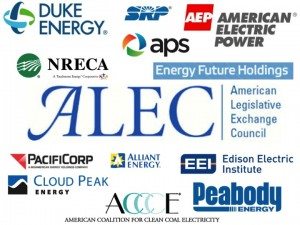This week, a trove of internal American Legislative Exchange Council documents published by The Guardian show that ALEC is nervous about IRS scrutiny over its state legislator lobbying operations, and an abandoned legislator pledge to ALEC that would have required state lawmakers to violate their oath of office.
Due to ALEC’s controversial work like pushing Stand Your Ground gun laws, busting worker unions and suppressing voters, 400 legislators and 60 companies have fled ALEC since the 2011 launch of ALEC Exposed, 41 of which ALEC is begging to rejoin its ranks through a misspelled project called “Prodigal Son.”
ALEC’s New Attacks on Clean Energy, Climate Change Action
Today, The Guardian followed up with ALEC’s anti-environmental agenda, as outlined in the leaked ALEC documents and other material for ALEC’s States and Nation Policy Summit in Washington, DC, which began this morning.
As we saw in Kansas, North Carolina and now Ohio, ALEC and the State Policy Network pushed to repeal state incentives for renewable energy projects and jobs, with very limited success. After bipartisan push back in those states, ALEC created a new bill that is a more subtle attack on clean energy, using Renewable Energy Credits to reduce in-state clean energy growth and water down what energy resources qualify as “renewable.” From the Guardian:
At its meeting in August, Alec put forward an initiative that would allow utility companies to import clean energy from other states rather than invest in new, greener generation.
An “explanatory note” prepared for the meeting admitted: “One model policy may be the right fit for one state but not work for another”.
[Energy and Policy Institute Executive Director Gabe] Elsner argued that after its bruising state battles in 2013, Alec was now focused on weakening rather than seeking outright repeal of the clean energy standards.
“What we saw in 2013 was an attempt to repeal RPS laws, and when that failed what we are seeing now is a strategy that appears to be pro- clean energy but would actually weaken those pro- clean energy laws by retreating to the lowest common denominator,” he said.

ALEC’s top coal company members
The Guardian opens with a bit on ALEC’s work for its utility member companies to make it prohibitively costly for homeowners to put solar panels on their rooftops and feed extra electricity then generate back into the grid–a process spurred by “net metering” laws, which exist in most states. ALEC’s new resolution could be used to lower or outright kill those net metering payments, or to add fixed charges to solar customers.
John Eick, who is temporarily running ALEC’s Energy, Environment and Agriculture task force now that Todd Wynn jumped ship for Edison Electric Institute, accuses homeowners that feed solar energy back into the grid of being “freeriders,” despite making their own capital investments in rooftop solar and producing a surplus of electricity that then supplies the entire grid:
“As it stands now, those direct generation customers are essentially freeriders on the system. They are not paying for the infrastructure they are using. In effect, all the other non direct generation customers are being penalised,” he said.
Eick dismissed the suggestion that individuals who buy and install home-based solar panels had made such investments. “How are they going to get that electricity from their solar panel to somebody else’s house?” he said. “They should be paying to distribute the surplus electricity.”
In November, Arizona became the first state to charge customers for installing solar panels. The fee, which works out to about $5 a month for the average homeowner, was far lower than that sought by the main electricity company, which was seeking to add up to $100 a month to customers’ bills.
ALEC’s utility members fear the revolution that is distributed solar generation. The effort to make rooftop solar energy more costly in Arizona has been led by ALEC member utility Arizona Public Service, which lied to the public in attempts to hide its funding of groups affiliated with the Koch brothers that have run ads against incentives for rooftop solar production. APS recently rejoined ALEC after a short year where it had distanced itself.
Ultimately, ALEC’s battle against clean energy, and the jobs that come with it, fits into their decades-long role in the climate change denial movement.ALEC has consistently fought to deny the science of climate change, force teachers to misrepresent climate science to their students, and churned out copycat state bills to block regulations of greenhouse gases.
[Check out this leaked 1998 memo from an American Petroleum Institute meeting that identified ALEC and other industry front groups to coordinate against the Kyoto Protocol and U.S. legislation to prevent runaway global warming.]
The Guardian reports on ALEC’s latest effort to block President Obama’s administration from reducing carbon pollution:
The meeting will also focus on Obama’s plan, announced last June, to use the EPA to limit greenhouse gas emissions from future and existing power plants.
“The EPA’s forthcoming regulation of greenhouse gas emissions and specifically carbon emissions from power plants will be of incredible interest to states and membership so we are going to be focusing on that. Absolutely,” Eick said.
Power plants are the biggest source of greenhouse gas emissions, accounting for about 40% last year. The EPA last September proposed new standards for future power plants, and will tighten limits for existing power plants next June.
“It just shows that Alec uses lawmakers as lobbyists to block climate legislation at every turn,” said Connor Gibson, a researcher for Greenpeace. “They try to undermine the authority of agencies that have the power potentially to control carbon pollution, so whenever there is a new EPA rule that pops up, they re-tool their arsenal of model bills to make sure they are blocking the new rule.”

ALEC’s top petrochemical members
And who drives this dirty work? Well, ALEC’s dirty energy members includes companies Koch Industries, ExxonMobil, Chevron, Duke Energy, Peabody Energy and American Electric Power; trade organizations like the American Petroleum Institute, Edison Electric Institute and American Coalition for Clean Coal Electricity; and State Policy Network climate denier groups like The Heartland Institute, Americans for Prosperity and the John Locke Foundation.
ALEC: We Don’t Lobby…We Just Help Corporations Write State Laws and Make State Legislators Pass Them
By facilitating the exchange of copycat “model bills” between state legislators corporate lobbyists from companies like Koch Industries, ExxonMobil, Pfizer, AT&T and other large companies, ALEC looks to have been lobbying far beyond what is allowed by the United States Internal Revenue Service. ALEC’s own lawyer helped ALEC spin off a 501(c)4 organization called the Jeffersonian Project in order to move its most blatant lobbying tactics out of ALEC’s house. This validates multiple existing complaints submitted to the IRS documenting how ALEC has violated its tax exempt status.
Common Cause’s 2012 whistleblower complaint to the IRS is heavily documented, but you need not be a tax expert to see how ALEC is a valuable lobbying group for Fortune 500 companies: it brings state legislators into private meetings with corporate lawyers to craft model bills that are then introduced into state legislatures. Many of the perks ALEC offers, like travel to ritzy hotels, fancy dinners, cigar parties, trips to the tar sands…are paid for by corporations through an ALEC slush fund.
Most state legislators offer little to no disclosure of any of this, and ALEC certainly doesn’t provide transparency. It’s corporate and legislative rosters are not public.
ALEC: the Driving Force in the State Policy Network
ALEC is a central organization in the State Policy Network, a web of corporate shill groups operating in each state using a nationally coordinated template agenda. SPN CEO Tracie Sharp has likened this cookie cutter mode of operation to that of IKEA in private discussion, undercutting her public assertions that SPN groups think for themselves.
Both ALEC and SPN are funded by the usual suspects like the Koch brothers foundations and the Searle Freedom Trust, but also through the secretive DonorsTrust and Donors Capital Fund groups, which hide the identities of wealthy, ideological donors who are embarrassed to publicly associate with the dirty work of ALEC and other SPN affiliates.
The People Push Back on ALEC Legislators and Lobbyists
Just about every time ALEC has convened its corporate lobbyists and state legislator members since mid-2011, protestors have shown up at their door (see the news from protests in Chicago last August and Oklahoma City last April). That trend continues in Washington, DC tomorrow, with a DC Stands Up To ALEC rally convening at 11:30 AM at Franklin Park before marching to the ALEC conference at the DC Grand Hyatt.
If you’re in the District, we’ll see you there!




